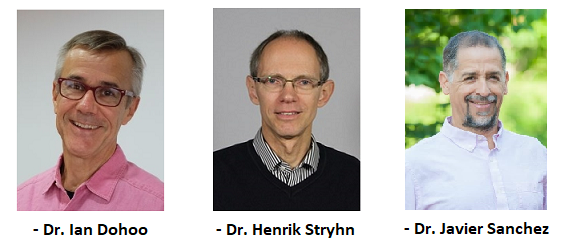The courses will be offered in a hybrid format. Participation will be possible both on-site and virtually, but only a limited number of online participants will be admitted. All sessions of the courses will be streamed online by video-conferencing software, and all lectures and demonstrations will be recorded and made available to participants. Additionally, all course material will be accessible online.
The early bird registration deadline is June 15. There is a 10% discount to register for both courses.
Module 1: Building better causal evidence using directed acyclic graphs (DAGs)
July 7-11 (Schedule)
Instructors:
Dr. Viki Brookes, Associate Professor, The University of Sydney
Dr. Annette O’Connor, Professor, Michigan State University
Dr. Ian Dohoo, Professor, University of Prince Edward Island
Abstract: Do you ever lose sleep over a potentially ‘unmeasured confounder’ or when your causal analysis is not perfectly fit-for-data or predictable? If you answer affirmatively to either of those questions – this 5-day workshop may be beneficial to you.
Directed acyclic graphs (DAGs) are powerful tools in supporting causal inference, in particular, for variable selection when designing observational studies and when building statistical models. In a recent review of a random subset of 200 veterinary observational studies only 5 reported a DAG (Sargeant et al., 2022). Many of us have been guilty of this omission, however, here is an opportunity to (re)discover the science of using DAGs to prevent major causal fallacies.
By the end of this course, participants will be able to:
- describe the differences between bias and non-systematic variation and how they impact estimates for an observational study,
- draw a DAG for an observational study of their choice, and understand how to elicit information to inform the DAG,
- use a DAG to inform variable adjustment strategies, and describe the implications of inappropriate choices, and
- use DAGs when critically appraising observational studies.
The workshop will cater to all levels of epidemiological background. Those less familiar with the content area will be gently mentored during the week to make their life easier. Participants are encouraged to bring their own topic of interest and benefit from the instructors’ support.
Module 2: Introduction to Multilevel Modelling
July 14-18 (Schedule)
Instructors:
Professors Ian Dohoo, Henrik Stryhn, and Javier Sanchez
CVER, AVC, University of Prince Edward Island (UPEI)
Abstract: The 5-day course is designed to provide participants with the knowledge and skills required to successfully fit multilevel models to both continuous data (linear models) and discrete data (emphasis on logistic and Poisson models). The presentation of theoretical background material is limited to that which is required for a reasonable understanding of the methods employed. Specific topics covered in the course include:
introduction to multilevel/hierarchical data, mixed models for continuous data, mixed models for discrete data, model evaluation (diagnostics), analysis of repeated measures and alternative approaches to dealing with clustered data (including Bayesian methods). The main software used for the instruction is MLwiN, but the code for fitting models in additional software packages (including Stata and R) will also be provided.
REGISTRATION
Registration for the Summer Courses is now open! For each module, the following registration fees will apply (amounts are in $Cdn and include taxes and administration fees).
Module 1: Building better causal evidence using directed acyclic graphs (DAGs)
July 7-11
Participant On/before June 15th After June 15th Student* 900 1000 Non-student 1450 1550
Module 2: Introduction to Multilevel Modelling
July 14-18
Participant On/before June 15th After June 15th Student* 900 1000 Non-student 1450 1550
*Proof of registration in any degree program at a recognized university.
To register, please use the platform AudienceView by clicking on the picture below.
ACCOMMODATION
Participants will have to book their own accommodations. Below you will find information on places to stay by visiting links to our Tourism PEI website and on campus residences. Please contact the hotel or residence directly to book your accommodation.
The Tourism PEI (http://www.tourismpei.com/index.php3) website will provide you with links to a variety of accommodations across the Island as well as information on places to eat, festivals and events and things to do during your stay.
The UPEI Campus offers residence rooms to conference participants. Choose from one of the UPEI residences, each with its own unique style and amenities. Residence accommodations include free parking, local telephone access, a bed linen and towel exchange service, and 24 hour security.
(http://www.upei.ca/conference/accommodations)
For further inquiries, please contact professor Henrik Stryhn at hstryhn@upei.ca.




